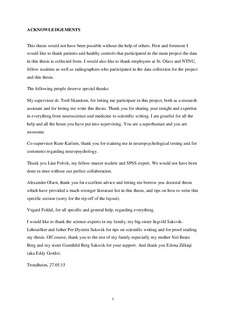| dc.description.abstract | This thesis examined the consequences mild Traumatic Brain Injury (TBI) has on neuropsychological measures of attention two weeks after injury, using the Cambridge Neuropsychological Test Automated Battery (CANTAB). Most studies report attention to be impaired after mild TBI. Moreover, attention might be more impaired in patients with findings on neuroimaging, characterized as having a complicated mild TBI, because networks controlling attention are widespread in the brain and axonal injuries like traumatic axonal injury are suggested pathophysiology after mild TBI. Mild TBI patients do also often report psychological complaints. Psychological and other mild TBI comorbid factors make it difficult to determine the effect neuropathology has on neuropsychological performance. The CANTAB is potentially better suited to assess neuropsychological functioning after mild TBI, since traditional neuropsychological measures have been criticized. It was hypothesized that I) Mild TBI patients would perform worse on neuropsychological measures of attention and report more distress on selected self-reported measures than healthy matched controls 2 weeks after injury. II) That complicated mild TBI patients would perform worse on neuropsychological measures of attention than uncomplicated mild TBI patients and healthy matched controls 2 weeks after injury. A final sample of 62 patients with mild TBI and 49 healthy matched controls were compared on performance in the CANTAB analyzed with multivariate and univariate analysis. The participants answered questionnaires assessing self-reported symptoms, these were analyzed with univariate measures. All patients were examined with MRI at 3 Tesla within 72 hours after injury. There was no statistical significant difference between patients with mild TBI and matched healthy controls on measures of attention. CT and MRI results identified 7 patients with complicated mild TBI, a group too small to analyze statistically. The patients reported significantly more complaints on concentration, memory and pain compared to controls. It was concluded that the sample in this thesis was representative for the mild TBI population and that although some patients reported complaints on some self-reported measures, most patients with mild TBI show good neuropsychological outcome of attention two weeks after injury. | nb_NO |
